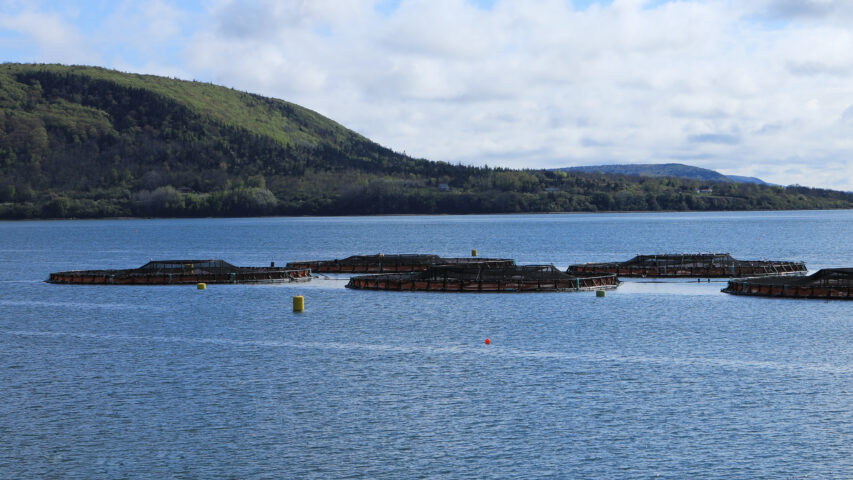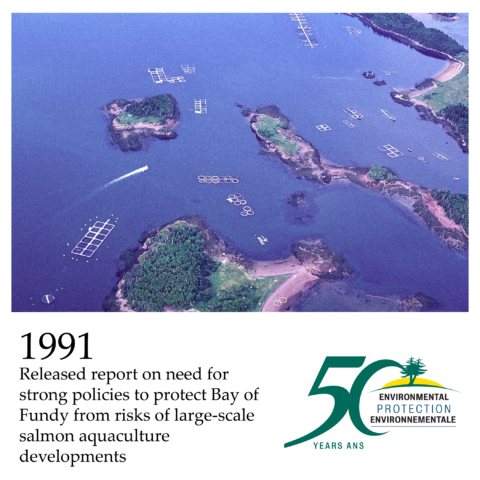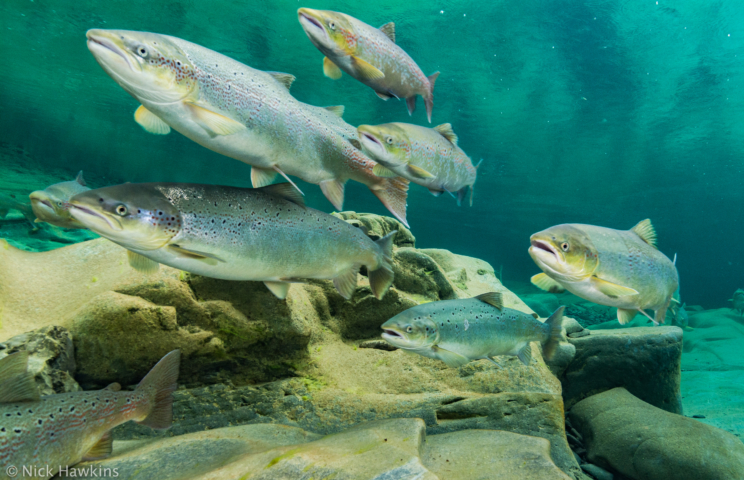Sign Our Petition: No More Salmon Farms In The Bay Of Fundy
Fundy Baykeeper says pesticides, disease endemic with dense salmon farming among issues with proposed new site in Beaver Harbour
Matt Abbott says pesticides, disease endemic with dense salmon farming among issues with proposed new site in Beaver Harbour
The Conservation Council’s Fundy Baykeeper says a proposed new salmon aquaculture site in the Outer Bay of Fundy would add more stress to an already sensitive marine ecosystem while rewarding the company for poor business practices.
Cooke Aquaculture is seeking approval from the provincial government to install a new salmon aquaculture site in Beaver Harbour in southwest New Brunswick. The proposed new site is still being considered by government. A decision could come any day.
You can help amplify our call for the provincial government to reject this application. This part of the Bay of Fundy already has some of the densest siting of fish farms in the world. The system can’t handle more of the stress, disease and pesticides associated with large-scale fish farms. Add your voice below!
I’m calling on the New Brunswick government to reject the request from Cooke Aquaculture to install a new salmon aquaculture site in Beaver Harbour in the Outer Bay of Fundy.
Southwestern New Brunswick’s coastal waters already have some of the densest salmon aquaculture siting in the world. Threats from salmon aquaculture include legal (and illegal) pesticide use; risks to wild salmon from interbreeding, sea lice and disease; nutrient pollution; marine debris; and conflicts with other users on the water—most pronounced in 2009-10 when lobsters were found dead from illegal pesticides used by a subsidiary of Cooke Aquaculture.
Furthermore, approving a new lease to “replace production” from existing, unproductive sites risks encouraging companies to keep problem sites to ‘trade’ for new sites, instead of returning unused leases to the province.
The Outer Bay of Fundy is under enough stress from existing salmon aquaculture sites and the effects of climate change. It doesn’t need any more threats. Please reject Cooke’s application for a new salmon farming site.
Learn more about salmon aquaculture in the Bay of Fundy
Learn more about salmon aquaculture in the Bay of Fundy

The Bay of Fundy waters where the multi-billion-dollar Cooke Aquaculture is proposing the new fish farm already house some of the densest siting of aquaculture farms in the world.
When the sites were being developed in the late 1900s, it was described as a “gold rush” with lots of companies wanting in on the lucrative (but environmentally costly) opportunity, leading to many sites, some very close together, in a relatively small area.
Originally, several companies operated these sites but the persistent and endemic challenges of sea lice and disease with dense salmon farming allowed Cooke to buy up its competitors and grow into the multinational corporation it is today.
Now, the main players in the N.B. salmon aquaculture industry are Cooke Aquaculture and Mowi, a Norwegian-owned company.

Of course, salmon aquaculture does not exist in a vacuum in the Bay of Fundy. The dynamic and sensitive waters of the Bay face many pressures. Chief among them is climate change.
The Bay of Fundy – Gulf of Maine system is among the fastest warming water bodies in the world, leading to changes that affect species that have historically thrived in the cold, rich, Fundy waters.
Adding to this is the related declines or changes in species that have historically been at the base of the Fundy food chain, like herring and copepods (a small rice-sized animal that is the preferred prey of the endangered North Atlantic right whale).
There are also significant sources of chemical pollution posing threats to our waters, be it effluent from pulp and paper mills; sewage overflows; oil, diesel, gas or other spills from all sizes of boats; or pesticide and other chemical wastes from aquaculture (more on this below).
Even noise, especially that produced from large tankers, should be considered a pollutant as it has been shown to harm and stress animals, including right whales.
Salmon aquaculture adds to these many stresses, especially in the outer Bay of Fundy. Threats from salmon aquaculture include legal (and illegal) pesticide use; risks to wild salmon from interbreeding, sea lice and disease; nutrient pollution; marine debris; and conflicts with other users on the water—most pronounced in 2009-10 when lobsters were found dead from illegal pesticides used by a subsidiary of Cooke Aquaculture.
Kelly Cove Salmon, the Cooke subsidiary, was charged in 2011 under the Fisheries Act for the illegal use of cypermethrin. The company paid $500,000 in fines, the largest penalty ever levied under the Act in New Brunswick and among the largest ever levied in Canada.

While aquaculture practices have changed over the years, the issues outlined above persist, and problems with disease and sea lice may only get worse as waters warm.
In light of these threats, it is galling that Cooke Aquaculture would even consider adding sites to this already heavily-impacted region.
Prior to Cooke’s applying for this new site (and one other site proposal which has since been withdrawn), it was understood that there was a de-facto moratorium on new sites in the Outer Bay of Fundy.
Cooke’s rationale for seeking a new site in the already densely-sited region is a significant concern in and of itself—approval by government risks setting a precedent of further overloading the sensitive and stressed Outer Fundy waters with more and more salmon farms.
In a letter to Fundy North Fishermen’s Association, the province stated that the new site being applied for “would assist in replacing production from other farms that have recently been taken out of production.”
The province further details that “existing leases, such as some in Upper Passamaquoddy Bay area, are not presently in production for salmonids due to sea lice issues.”
In light of these threats, it is galling that Cooke Aquaculture would even consider adding sites to this already heavily-impacted region.
Matt Abbott, Fundy Baykeeper Tweet
It should be noted that while Cooke seeks to “replace production” from existing sites, it is not committing to return and restore the unused sites. In short, the company is finding it hard to grow fish on existing leases due to sea lice (an issue common to the industry and often exacerbated by high stocking densities and other practices), so is asking for a new site.
It’s also noteworthy that government mentions Upper Passamaquoddy Bay as a particular problem area. It has long been known that the waters of Upper Passamaquoddy Bay have a large, circular current and low flushing rates, meaning aquaculture sites in the area are at high risk of transfer of sea lice and disease and of nutrient buildup.
The issues with these particular sites were well known when Cooke acquired them, suggesting the company either thought it could overcome the issues, or they saw value in the sites in some other way.
If the province grants Cooke a new lease to “replace production” from ineffective sites, they would effectively be rewarding Cooke’s poor business decision to acquire sub par sites in the first place, as well as set a precedent that industry can be compensated for loss of production at a given site (due perhaps to mismanagement or some other factor).
The Conservation Council has long advocated, with our allies in marine conservation, for healthy waters, sustainable fisheries and sustainable aquaculture practices to support the Bay of Fundy’s rich coastal communities.
When commercial fish farms flooded the Bay of Fundy by the hundreds in the 80s, we were the first organization to call for sustainable aquaculture practices and warned what would happen if the industry continued without reasoned regulation in the bay.
We’ve outlined our concerns about the Beaver Harbour proposal to government and will continue to push back against salmon aquaculture expansion in the Bay. Stay tuned to this space for updates.
Learn more about Marine Conservation in N.B.
Learn more about Marine Conservation in N.B.
Share this article with your friends and family and invite them to add their voice!
